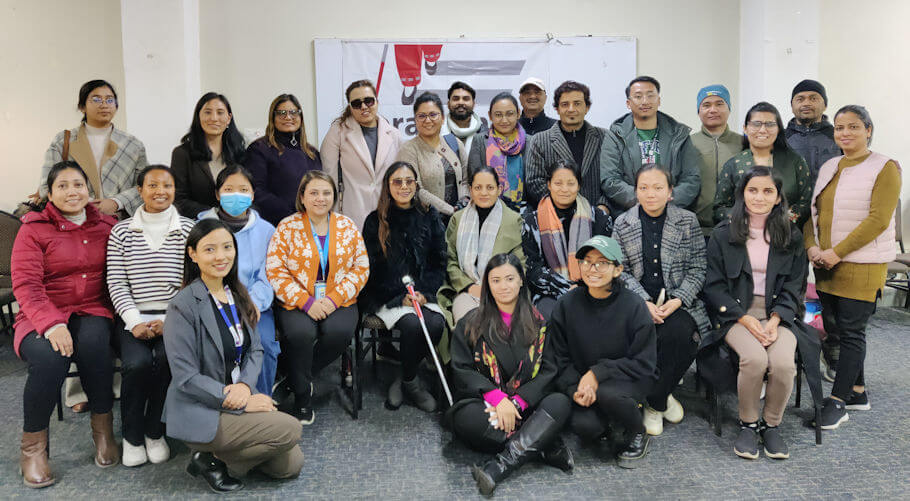Empowering Disability-Inclusive Development A Flagship Program of Prayatna Nepal
Author: Jalasa Sapkota
Published: 2024/01/20 - Updated: 2024/09/30
Publication Type: Informative
Category Topic: Events - Public Notices - Related Publications
Page Content: Synopsis - Introduction - Main
Synopsis: This symposium convened a diverse array of participants from the security sector, academia, UN agencies, various institutions, and young professionals. The symposium delved into nuanced aspects of disability, aiming to catalyze the emergence of a society that embraces inclusivity.
Introduction
A transformative event took place, showcasing strong commitment from diverse organizations and stakeholders to propel the cause of disability inclusivity. Spearheaded by Prayatna Nepal, a non-profit organization dedicated to enhancing the rights and empowerment of persons with disabilities, the symposium delved into nuanced aspects of disability, aiming to catalyze the emergence of a society that embraces inclusivity.
Main Content
This symposium convened a diverse array of participants from the security sector, academia, UN agencies, various institutions, and young professionals. The event featured facilitators: Miss Sarita Lamichhane, Founder Chairperson of Prayatna Nepal, a renowned authority on gender and disability rights, and Miss Jalasa Sapkota, a youth disability activist. Their insights played a pivotal role in steering the discussions towards meaningful outcomes.
Central to the symposium was the exploration of the evolutionary trajectory of the concept of disability. Animated discussions on dissecting historical perspectives and evolving notions of disability took center stage. A voting process, centered on the election manifestos of four political parties, led to conclusions on the most inclusive approach in understanding four models of disability: the charity model, medical model, social welfare model, and human rights model. Consensus from voting emerged to embrace human rights of disability as the measure, as participants voted for the same.

The definitions of disability were discussed, with facilitators underscoring three critical conditions: long-term impairment, functional impairment, and participation restriction. Notably, insights into Nepal's laws and identification of ten distinct types of disabilities were also explored.
Nepal's government has taken substantial strides in addressing the severity of disabilities through a categorization system involving disability cards. Profound disabilities are marked by a red card, severe disabilities by a blue card, moderate disabilities by a yellow card, and mild disabilities by a white card.
The symposium emphasized etiquette and communication in the context of disability inclusion, providing participants with invaluable insights into appropriate terminologies and behaviors when engaging with individuals with disabilities.
In another session, Inclusive Organizational Development and the distinction between universal design and accessibility, participants gained insights into the concept of reasonable accommodation, basic guidelines on making physical accessibility, and digital accessibility to assist all kinds of disabilities. Discussions revolved around how organizations are integrating disability-inclusive development into their operations, emphasizing the significance of reducing barriers. Guiding principles for Disability-Inclusive Development were delineated, promoting a holistic approach to development.
The transition from Community-Based Rehabilitation (CBR) to Community-Based Inclusive Development (CBID) was explored, showcasing evolving strategies in this domain.
In the segment analyzing gaps in disability inclusion, participants were equipped with insights on identifying barriers within the ACAP model (Attitude, Communication, Access, Participation) to uncover gaps and propose solutions for disability-inclusive development. The interconnection of disability rights and human rights was discussed in relation to achieving sustainable development goals. The concept of marginalization was explored with a focus on three key assessments: identification, internalization, and contextual understanding of disability.

The symposium concluded with impactful recommendations to infuse disability inclusion into organizational programs, ranging from creating disability-inclusive job vacancies and ensuring inclusive job recruitment to fostering awareness through workshops, implementing pragmatic policies, ensuring physically accessible infrastructure, digital and communication accessibility, and prioritizing diverse representation in leadership roles.
In the collective reflection of participants, a shared understanding emerged that disability inclusion is not a luxury but requires consideration and an understanding of intersecting needs to drive positive attitudes and policies. It is an attainable goal, not an unattainable dream.
This symposium signifies a pivotal milestone in the ongoing journey towards creating a society where individuals with disabilities can fully participate and thrive. Prayatna Nepal, in collaboration with stakeholders, remains resolute in driving positive change and advocating for disability inclusion on all fronts.
 Author Credentials: Jalasa Sapkota is a visually impaired writer, researcher, and advocate for disability inclusion. With a background as a former Research Assistant at Diverse Patterns Limited and now as a Resource Person for the International Council for Education of People with Visual Impairment's (ICEVI) Gender Equality and Women's Rights Task Group, she has dedicated her career to advancing the rights and opportunities of persons with disabilities. Visit Jalasa's biography for comprehensive insights into her background, expertise, and accomplishments.
Author Credentials: Jalasa Sapkota is a visually impaired writer, researcher, and advocate for disability inclusion. With a background as a former Research Assistant at Diverse Patterns Limited and now as a Resource Person for the International Council for Education of People with Visual Impairment's (ICEVI) Gender Equality and Women's Rights Task Group, she has dedicated her career to advancing the rights and opportunities of persons with disabilities. Visit Jalasa's biography for comprehensive insights into her background, expertise, and accomplishments.